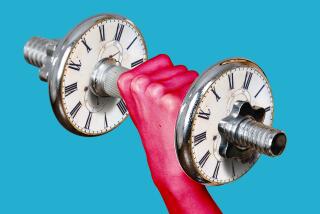Studies Cite Health Benefits of Running for Elderly
- Share via
CHICAGO — Two studies reported Thursday reinforce the health benefits of running for the elderly and dispel the myth that older people should not run because of damage they might cause to their knees or hips.
Researchers said they found that older people who run for exercise have stronger bones than elderly non-runners and do not suffer more frequently from arthritis or other joint-related diseases as was once commonly believed.
“For a long time, it has been said that if you use a joint, you’ll eventually wear it out,” said Dr. Nancy Lane, author of one of the studies published in the Journal of the American Medical Assn.
‘Bus Drivers’ Elbows’
“It was felt occupationally--soccer and football players’ knees, bus drivers’ elbows--that if you use the joint a lot and abused it, it would wear down. It seems at least in this case that’s not true,” she said.
Lane and her colleagues at the Stanford University School of Medicine studied 41 long-distance runners between the ages of 50 and 72 and a comparable group of non-runners. The runners, both male and female, had 40% more bone material than the non-runners, but showed no significant differences in the onset of joint disease or osteoarthritis.
The finding is of particular interest to women, Lane said, since they begin to lose bone density rapidly after the onset of menopause. Older women who run will lose less bone material and therefore be less susceptible to injuries caused by brittle bones, she said.
Not Predisposed to Ailments
Another study in the journal, by Dr. Richard Panush at the University of Florida in Gainesville, found that older runners did not seem to predispose themselves to ailments often associated with running.
“Pain and swelling of hips, knees, ankles and feet, and other musculoskeletal complaints among runners were comparable with those among non-runners,” Panush said.
Lane and Panush said their findings indicate older people should run or take brisk walks unless they have a medical ailment that prevents them from doing so, such as a heart condition or an arthritic disease already developing.






